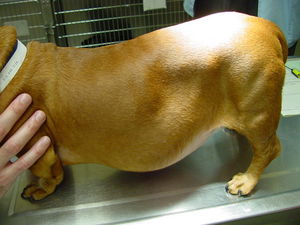Hyperadrenocorticism, also known as Cushing’s disease, is in
some ways the opposite of Addison’s disease we discussed last week. With this
condition, the body is producing too much circulating hormone. Certain breeds
such as poodles, dachshunds, boxers and beagles seem to be more prone to this
condition. Typically it is seen in middle to older patients. In some cases a
patient on prolonged steroid use may also demonstrate these symptoms. If the
external source of steroids is removed they may return to normal.
 |
| Image Source |
Symptoms of Cushing’s disease include increased drinking and
increased urination. In some cases this is extremely excessive! Externally
owners may note hair loss, increased pigment in the skin and also black heads
in the skin. Additionally the abdomen will sometimes look distended or
drooping. With any of these symptoms a visit to the vet is definitely
warranted!
 |
| Image Source |
There are several ways to start a diagnosis of Cushing’s
disease. A chemistry profile can show a significant elevation in the liver
enzymes, while a urinalysis will likely show a very low concentration. To
diagnose Cushing’s disease a blood test can be run which usually requires a
series of blood draws throughout most of the day. There are also urinary
screening tests that can be used to help determine if Cushing’s is a likely
cause for the symptoms. Further diagnostics such as x-rays, ultrasound or even
advanced imaging such as MRI or CT (computerized tomography) may be necessary
to determine the cause for this condition. These advanced tests are not always
needed but are sometimes recommended depending on the specific pet.
 |
| Image Source |
Treatment typically involves a medication that will be given
life long. If there are specific tumors that are contributing to the condition
then surgery could be an option. This however is not always financially
possible or physically possible for each patient. Regularly blood work and
monitoring for recurrence of symptoms is imperative to help regulate Cushing’s
disease. Every patient is different and what may work for one pet may not be
appropriate for another. They also can have different responses. It is possible
to over treat for this condition and cause a depletion of steroids which will
lead to symptoms similar to those mentioned with Addison’s disease last week.
 |
| Image Source |
If you see any of the symptoms especially increased
drinking/ urination in your pet it is a good idea to make a trip to the
veterinarian. They can help direct diagnostics so the appropriate course of
action is taken. For more information please visit Veterinary Partner’s
Cushing’s Center here.
No comments:
Post a Comment